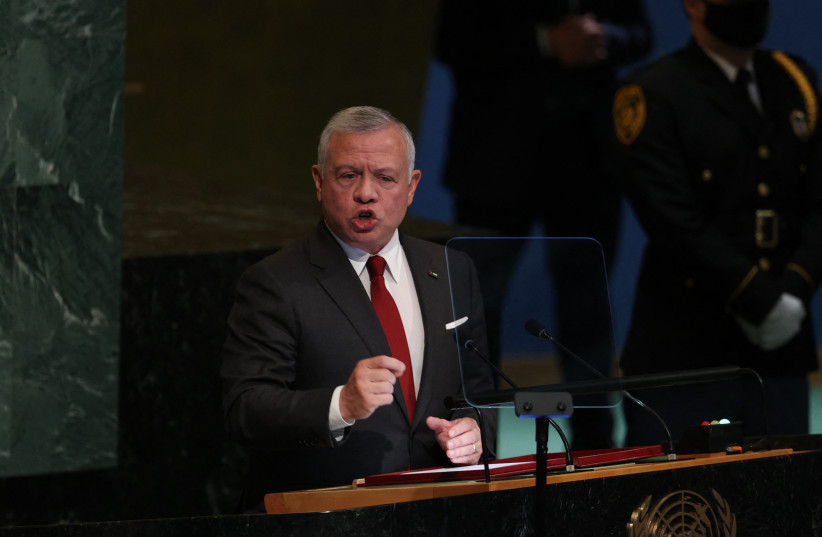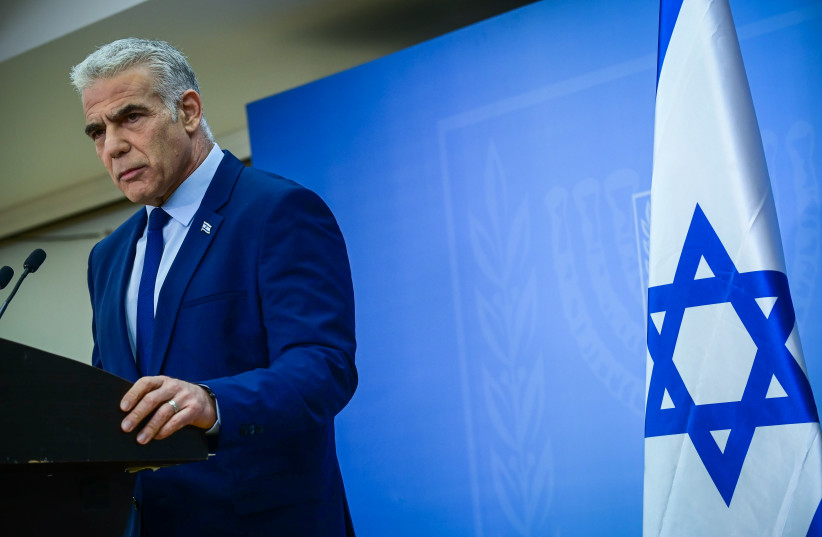by JPost Editorial
Amman sees itself as a guarantor of the status quo and a custodian of the Holy Sites of the Dome of the Rock and al-Aqsa.
 |
Jordan's King Abdullah II addresses the 77th Session of the United
Nations General Assembly at UN Headquarters in New York City, US,
September 20, 2022.
(photo credit: AMR ALFIKY/ REUTERS)
|
King Abdullah II of Jordan warned Israel on Wednesday against making any changes to the status quo in Jerusalem. This was timed to coincide with the swearing in of Israel’s new government, which took place a day later.
Amman sees itself as a guarantor of the status quo and a custodian of the Holy Sites of the Dome of the Rock and al-Aqsa. This unique status has meant that the Hashemite Kingdom often issues these kinds of warnings to Israel.
But that’s not the only reason. Jordan is home to a large number of Palestinians and it is concerned that any conflict in the West Bank has the potential to spill over into its own borders. This means the warning is not just about Israel, it is also about Jordan.
“If people want to get into a conflict with us, we’re quite prepared,” Abdullah told CNN. “I always like to believe that, let’s look at the glass half full, but we have certain redlines... And if people want to push those redlines, then we will deal with that.”
Abdullah added that “there are a lot of people in Israel concerned as much as we are,” implying this his statements are no different than those uttered by supporters of the outgoing government of Yair Lapid.

Jordan has witnessed protests in recent weeks over high fuel prices. Criticizing Israel is an easy way for the king to divert attention away from the challenges his people face at home.
It’s vital that Israel’s incoming government – led by Prime Minister Benjamin Netanyahu – appreciate Jordan’s role and listen to the king’s concerns, and its layers of meanings.
Jordan’s warnings can be interpreted on face value as an assessment of the situation.
But they can also be seen as a warning that Jordan could redirect local anger towards Israel. Both Israel and Jordan are entwined when it comes to security and stability, and it’s imperative that they publicly appear to listen to one another.
The king said there are redlines related to Jerusalem. This relates to Amman’s concerns over the new Netanyahu government and its far-right members. Netanyahu has had a rocky and difficult history with Jordan but it is important to note that the king called the new prime minister shortly after it became clear he had won the election.
The kingdom is not interested in conflict with Israel and prefers to work with the new government. The outgoing government, led by Lapid and before him, Naftali Bennett, did much to reduce tensions with Jordan and held regular meetings with officials in Amman.
The security relationship between Israel and Jordan – always kept under the radar – is at a high level and has remained so despite whatever statements are made in public.
We have learned the hard way however that private relations and public incitement is not helpful in the long term. The Oslo Accords were rooted in this contradiction, where the Palestinian Authority would incite against Israel and create generations of hate, while working with Israel’s security forces.
Jordan has adopted the same strategy because the West and others have built this into the relationship: It slams Israel and then works with Israel quietly. We’ve all come to accept this as a fact even if it does not have to be this way.
Nevertheless, it is smart to err on the side of caution. When Amman says it is concerned about a new intifada, it is worth looking at what is happening in Jenin and Nablus and the violence Israel has been dealing with in the West Bank over the past year.
Helping reduce the violence
Jordan has a role to play in helping to reduce the violence. Not only can it put out messages of moderation, but it can also crack down on weapons smuggling, some of which comes into Israel through Jordan.
The Hashemite Kingdom says it wants to bring people together. So does Israel, and we see the model of Israel’s relations throughout the Gulf as one example that can be used for countries to work on trade and coexistence in the region.
We should listen to Jordan but we should also ask that the kingdom listens to Israel.
JPost Editorial
Source: https://www.jpost.com/opinion/article-726183
No comments:
Post a Comment